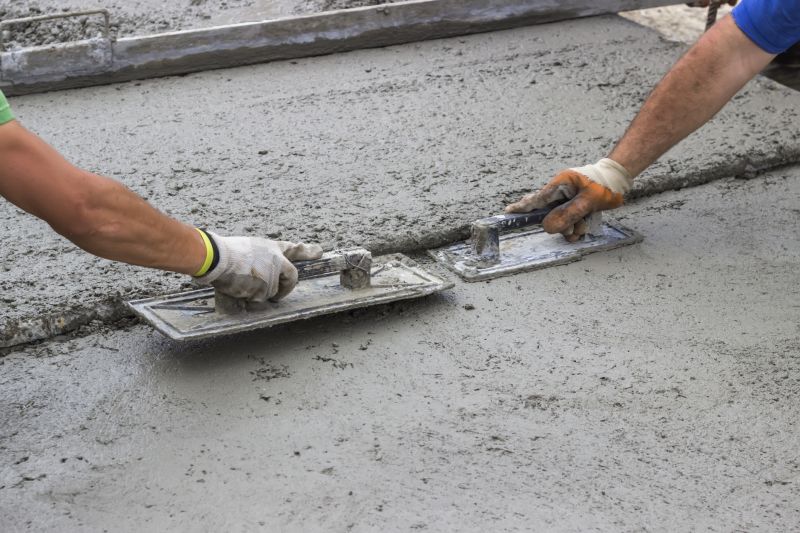Favorite Products For Concrete Surface Restoration
Select from highly recommended concrete repair options that help restore and reinforce your surfaces with confidence.
 Concrete repair products are essential for maintaining the integrity and appearance of concrete surfaces in both residential and commercial settings. Over time, concrete can develop cracks, chips, or surface deterioration due to weather, load stress, or age. Selecting the right repair materials can help restore the strength and durability of concrete structures, preventing further damage and prolonging their lifespan. Whether addressing small cracks or larger surface issues, a variety of products are available to suit different repair needs.
Concrete repair products are essential for maintaining the integrity and appearance of concrete surfaces in both residential and commercial settings. Over time, concrete can develop cracks, chips, or surface deterioration due to weather, load stress, or age. Selecting the right repair materials can help restore the strength and durability of concrete structures, preventing further damage and prolonging their lifespan. Whether addressing small cracks or larger surface issues, a variety of products are available to suit different repair needs.
Top Overall Option
Versatile Concrete Repair Compound
A highly adaptable repair compound designed for multiple applications including cracks, surface chips, and resurfacing. It offers ease of use, strong adhesion, and durable finishing, making it suitable for both DIY projects and professional repairs. Its formulation allows for smooth application and a seamless finish, helping to restore concrete surfaces effectively.
Types of Products For Concrete Repairs
Concrete Crack Sealants
Flexible sealants formulated to fill and seal cracks, preventing water infiltration and further damage.
Epoxy Injection Kits
High-strength epoxy resins used for structural crack repairs, providing bonding and reinforcement inside cracks.
Surface Patch Compounds
Ready-mixed or powder-based compounds for filling surface chips, holes, and minor surface imperfections.
Self-Leveling Overlays
Flowable materials that create a smooth, even surface over damaged or uneven concrete floors.
Concrete Resurfacing Products
Thin overlays designed to restore the appearance and surface integrity of worn or damaged concrete.
Polyurethane Foam Fillers
Expanding foam used to fill larger voids and stabilize loose or hollow sections.
Hydraulic Cement
Quick-setting cement for emergency repairs, especially effective for stopping leaks and sealing cracks.
Bonding Agents
Primers that improve adhesion between old and new concrete layers during repairs.
Concrete Sealers
Protective coatings that seal repaired surfaces against moisture and staining.
Fiber-Reinforced Patches
Patches embedded with fibers for added strength and crack resistance in structural repairs.
Polymer Modified Mortars
Enhanced mortars that provide improved adhesion and flexibility for surface repairs.
Resin-Based Coatings
Durable coatings that restore surface aesthetics and provide protection against wear.
Quick-Set Repair Mortars
Fast-curing mortars suitable for urgent repairs and patching large surface areas.
Waterproofing Sealants
Sealants designed to prevent water ingress in repaired or vulnerable concrete sections.
Expansion Joint Fillers
Materials that accommodate movement and prevent cracking at expansion joints.
Concrete Densifiers
Chemical treatments that harden and densify existing concrete surfaces.
Popular Choices
Widely used for sealing small to medium cracks to prevent water penetration and further deterioration.
Commonly selected for structural crack repairs due to their strong bonding properties.
Popular for quick fixes of surface chips and holes, providing smooth finishes.
Favored for leveling uneven floors and restoring flat surfaces efficiently.
Chosen for revitalizing worn concrete surfaces with minimal removal.
Often used for emergency repairs and sealing active leaks.
Commonly applied to ensure strong adhesion between old and new concrete layers.
Popular for protecting repaired surfaces from moisture and stains.
Effective for filling large voids and stabilizing loose sections.
Selected for their durability and aesthetic restoration capabilities.
Valued for fast repairs requiring minimal downtime.
Commonly used to safeguard repaired areas against moisture intrusion.
Important for accommodating structural movement and preventing cracking.
Applied to increase surface hardness and longevity.
Proper preparation is key before applying any repair product. Cleaning the area thoroughly to remove debris, loose concrete, or oils ensures better adhesion and a more durable fix. Many repair products are designed for easy application, often requiring minimal tools or expertise. Some formulations are suitable for interior use, while others are formulated to withstand outdoor conditions, including moisture and temperature fluctuations.
Understanding the specific type of damage is important in choosing the right product. For surface cracks, surface patching compounds or fillers may suffice. For structural cracks or deeper damage, epoxy injections or specialized fillers might be necessary. Additionally, for large-scale repairs or resurfacing, overlay materials and self-leveling compounds can provide a smooth, even finish. Regular maintenance and timely repairs can help prevent costly replacements and maintain the safety and appearance of concrete structures in Brentwood, TN.
Key Buying Considerations
- Identify the type and extent of concrete damage to select the appropriate repair product.
- Determine whether the repair is for structural stability or surface aesthetics.
- Consider the environmental conditions where the repair will be applied, such as exposure to moisture or temperature fluctuations.
- Check the curing time and whether the product requires special handling or tools.
- Evaluate the adhesion properties to ensure the repair material bonds well with existing concrete.
- Assess the flexibility of the product, especially for surfaces prone to movement or cracking.
- Review the ease of application, including mixing, spreading, or spraying requirements.
- Look for products that offer durability and resistance to wear, chemicals, or weathering.
- Consider whether a sealant or coating is needed post-repair for added protection.
- Ensure compatibility with existing concrete or repair materials to prevent adhesion issues.
- Review safety instructions and handling precautions for the chosen product.
- Determine if the product is suitable for interior, exterior, or both types of applications.
- Check for any special storage or shelf-life considerations.
- Evaluate customer reviews or professional recommendations for insights into performance.
